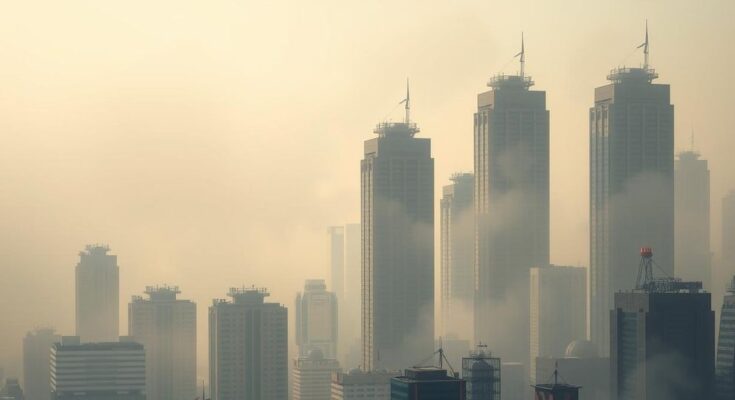A report finds that most of the world breathes polluted air, with only 17% of cities meeting air quality guidelines. The worst air quality is noted in Chad, Congo, Bangladesh, Pakistan, and India. Experts urge for improved monitoring and stricter pollution regulations, emphasizing the link between air pollution and climate change as urgent issues requiring immediate action.
A recent report reveals that a staggering majority of the global population breathes polluted air, with only 17% of cities worldwide complying with air pollution standards. Conducted by Switzerland-based IQAir, the analysis included data from 40,000 monitoring stations across 138 countries, highlighting Chad, Congo, Bangladesh, Pakistan, and India as possessing the dirtiest air. Notably, India is home to six of the nine most polluted cities, with Byrnihat being the worst.
Experts have expressed concerns that the real level of air pollution may be even higher due to insufficient monitoring, particularly in Africa, where there is just one station for every 3.7 million people. As a response to this issue, more air quality monitors are being deployed globally. The report this year introduced data from 8,954 new locations and approximately a thousand additional monitoring devices.
However, a setback occurred when the U.S. State Department announced it would cease the public release of pollution data collected from its embassies and consulates. Prolonged exposure to polluted air has been linked to serious health conditions, including respiratory illnesses, cancer, and Alzheimer’s disease. According to the World Health Organization, air pollution is responsible for around 7 million deaths annually.
Fatimah Ahamad, a chief scientist at Malaysia’s Sunway Centre for Planetary Health, emphasized the urgent need for action, stating that 99% of people live in areas that fall short of recommended air quality levels. “If you have bad water… but if you have bad air, you cannot tell people to pause breathing,” she noted.
Cities including Beijing, Seoul, and Rybnik, Poland, have successfully improved air quality through strict pollution regulations across various sectors. Additionally, the Association of Southeast Asian Nations has sought collaboration to manage pollution from transboundary haze, although results to date have been limited.
Shweta Narayan, a lead campaigner at the Global Climate and Health Alliance, underscored the correlation between air pollution and climate change, asserting that addressing emissions from fossil fuels can also enhance air quality. In her view, “Air pollution and climate crisis are two sides of the same coin.”
The report indicates a critical global challenge, with the majority of the population exposed to harmful air pollution. Efforts to enhance monitoring and implement stricter regulations in various cities have shown promise, yet significant barriers remain. The detrimental health effects associated with poor air quality demand immediate action to protect public health and the environment. Furthermore, addressing the intertwined issues of pollution and climate change is essential for sustainable progress.
Original Source: apnews.com




